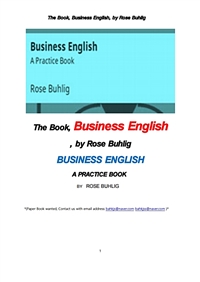비지니스 영어 (The Book, Business English, by Rose Buhlig)
뉴가출판사
Rose Buhlig
2020-03-26
대출가능 (보유:1, 대출:0)
책소개
저자소개
목차
비지니스 영어.The Book, Business English, by Rose Buhlig <br/>PREFACE <br/>THE author of this book and the writer of this preface have never met. Their <br/>respective fields of labor are a thousand miles apart. Yet such is the force of <br/>ideas that many of their thoughts and sympathies are common. <br/>Business English! The very name is an anomaly. From a literary point of view <br/>there is no such thing. English is English whether it be used to express the <br/>creations of our imagination, our aesthetic appreciations, or our daily wants. <br/>There is no magical combination of words, phrases, and sentences that is <br/>peculiar and distinctive to business transactions. Business English as used in <br/>these pages means effective communication, both oral and written. The author's <br/>aim throughout has been to teach the art of using words in such a way as to <br/>make people think and act. To do this she has applied the principles of literary <br/>composition to the highly complex and ever increasing problems of our business <br/>life. She realizes that business is vital, and that the problems of commerce are <br/>not to be met and handled with dead forms and stereotyped expressions of legal <br/>blanks. <br/>To use our language effectively it is necessary to have an understanding of its <br/>elements. Thus the author has very wisely devoted much space to word- study <br/>and English grammar. This is a field commonly neglected in books on the subject. <br/>The people engaged in business are, on the whole, woefully weak in the grammar <br/>of our language. It is believed that the treatment herein will be a great aid in <br/>correcting this deficiency. If we have ideas, we must express them in words, and <br/>our words should be so chosen and arranged as not to offend, but to please and <br/>interest. This result can be secured by a systematic study of Part I.[ iv]<br/>Part II deals with oral and written composition. Here the author has arranged <br/>her subjects in such a way as to give the whole a cumulative effect. The method <br/>throughout is inductive, and sufficient examples are always given to warrant the <br/>conclusions drawn. Most textbooks on Business English neglect the subject of <br/>oral English. This book regards the spoken word as important as the written word. <br/>If there be any one feature in this textbook more to be commended than <br/>another, it is the exposition in Part III. The situations arising in many different <br/>kinds of business are here analyzed. The author believes that the way to become <br/>a good business correspondent is, first, to learn what the situation demands and, <br/>second, to practice meeting the demands. We must know before we write. Given <br/>a knowledge of the subject, we must have much practice in expressing ourselves<br/>in such a way as to make our composition effective. The author meets this need <br/>by supplying many and varied exercises for practice. These exercises are live, <br/>practical, and up- to- date. The problems to be solved are real, not imaginary. <br/>Thus the power to be gained in meeting these situations and solving these <br/>problems will prove a real asset to those who contemplate a business career. It <br/>is confidently hoped that both teachers and pupils will find in this work material <br/>which will help them to prepare themselves to meet the many problems and <br/>demands of our growing commercial needs. <br/>DANIEL B. DUNCAN<br/>COLUMBIA UNIVERSITY<br/>January, 1914.




